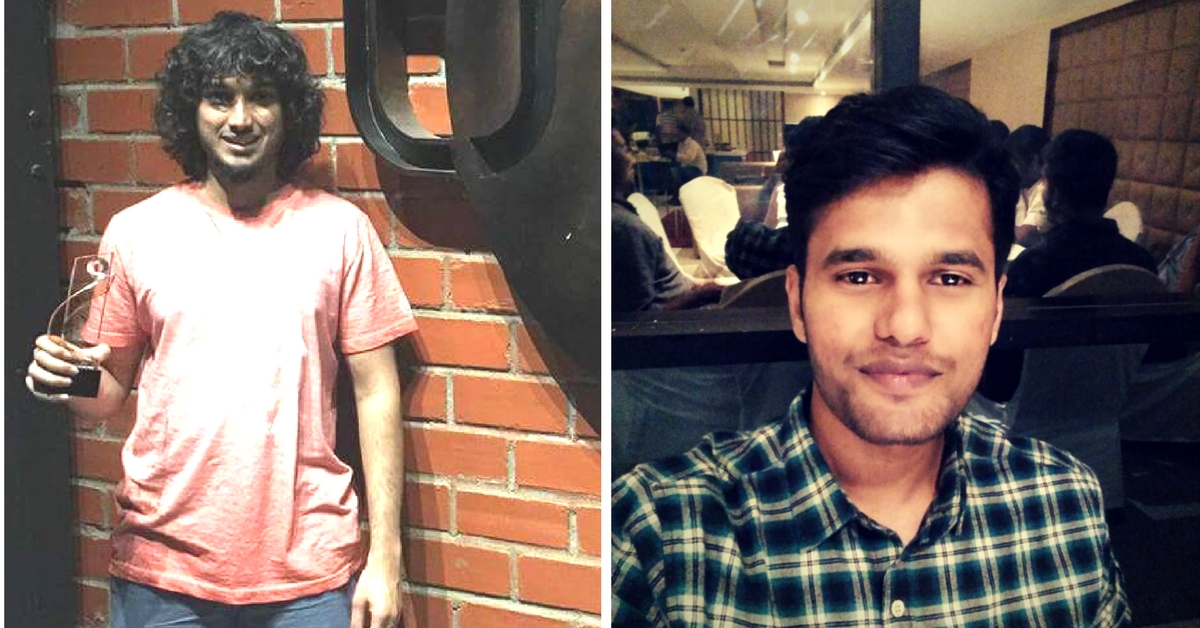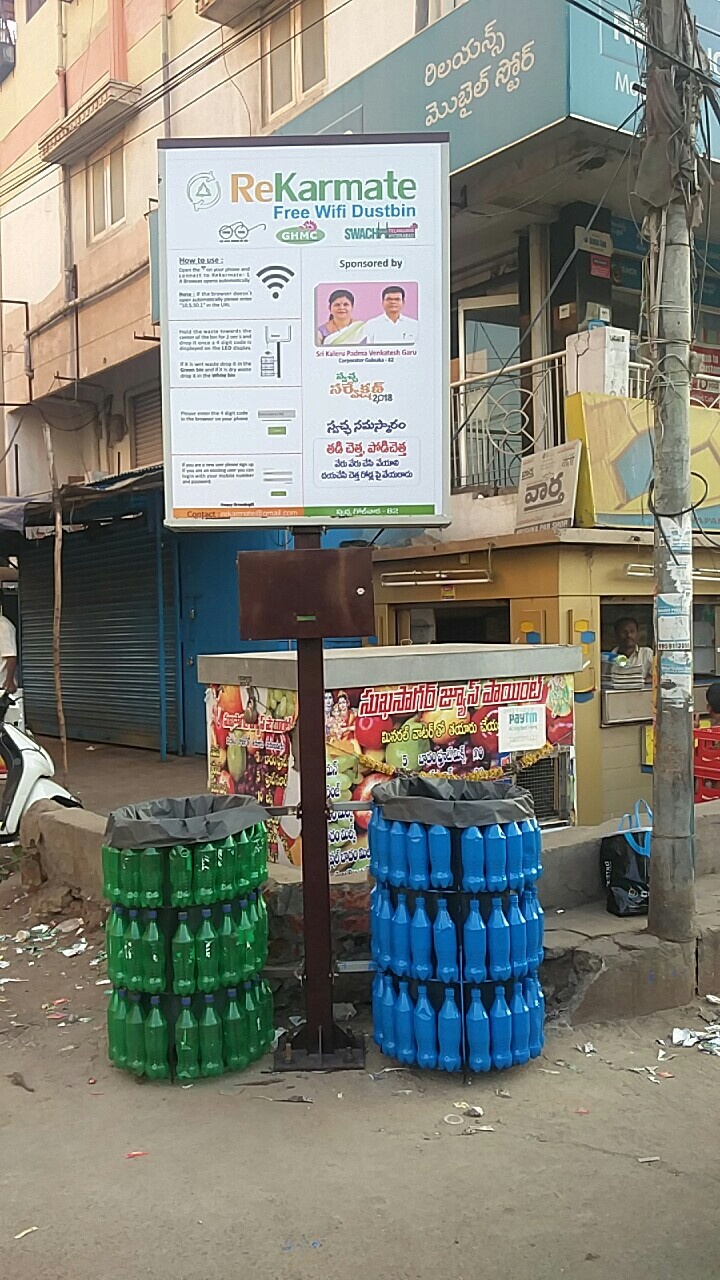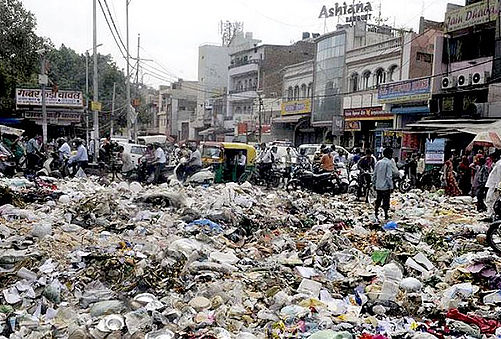How Can Free Wi-Fi help Segregate Waste? These Hyderabadis Will Show You
The Rekarmate initiative was started by two law school graduates.

Commuting from Sonipat to New Delhi on a regular basis, Chanakya Basa and Mani Kanth, law students at the famous Jindal Global Law School in Sonipat, often passed the notorious Bhalswa landfill in north Delhi. “It was huge with waste stacked up like massive mountains. The stench was always unbearable,” says Chanakya.
After multiple journeys and many fruitful conversations about efficient waste management systems, both men had some sort of inkling about wanting to be a part of the solution.
After graduating from law school, Mani and Chanakya returned to Hyderabad, the city where they were born and raised.
“Hyderabad had similar problems. We didn’t want it to become another Delhi. The fear of this city crumbling under the weight of garbage compelled us to work on solutions. Maybe it was personal too. Both of us have an innate love for this city,” muses Chanakya.

With this inspiration behind them, Chanakya and Mani founded Rekarmate in October 2016. Rekarmate is a public service initiative which seeks to rid cities of landfills, the child labour involved in the collection and dumping process and fight against the unscientific treatment of waste.
Indian cities are choking under the weight of waste. They generate approximately 62 million tonnes of municipal solid waste annually, and only 25% of this waste is processed, while the rest is dumped in landfills dotted across our urban centres. One of the primary reasons for the unfortunate proliferation of landfills is our inability to segregate waste.
The segregation of waste is among the Solid Waste Management Rules issued by the Government of India under its flagship Swachh Bharat Abhiyan scheme in 2016.
According to the SWMR, all waste generators, including households, must segregate their waste into three categories—dry waste (plastic, paper, wood, metal), domestic hazardous waste (sanitary napkins, cleaning agents, diapers) and biodegradables—before they hand over their garbage bins to local collectors.
In a bid to spread awareness about waste segregation and promote its use, the Rekarmate Mission has come up with a unique solution called Wi-Fi Dustbins inaugurated this month by Hyderabad mayor B Rammohan.

How does this work? Speaking to The Better India, Chanakya explains that there are three stages in the Rekarmate process.
Step-1: To use the bin, you turn on the Wi-Fi on your phone and connect to ‘Rekarmate-1’. Once a connection is established, a web browser pops out.
Step-2: Now, you identify the waste and drop it in the designated bin. For dry waste, you use the blue bin, and for wet waste, you use the green bin.
Step-3: Once you drop the waste in the bin, a four-digit code is displayed on the LED screen. You enter the four-digit code on the web browser on your phone and sign in/sign up to get uninterrupted access to the internet for the next 45 minutes.
There are two sensors inside each bin. When you dump the waste inside the bin, the sensors track that movement and they generate a code on the screen. The user enters this code in the captive portal. If the codes match, you get access to the internet for the next 45 minutes.
Read also: A Bengaluru Temple Has Been Zero Waste Since 2016. This Is What They Are Doing Right
Since the project is only in its pilot stage, there are logistical issues that both Mani and Chanakya have to resolve, and for the time being, this entire process depends on a certain degree of trust since the sensors cannot figure out whether the user is dumping dry/wet waste in the correct dustbin.
Chanakya says that the testing phase is currently in operation out of one set of dustbins in the Golnaka area of Amberpet, a suburb adjacent to the famous Osmania University.
“Since the initiative is in the pilot stage, we are using a regular broadband fibre connection, which gives a speed of about 1 Mbps for 45 minutes for ten people at a time,” says Chanakya.
“We also have a software at the backend which keeps a track of the users and user logs and time.” Based on the location and the number of people using the free internet service, Rekarmate says they can upgrade the hardware if required.
In essence, this Wi-Fi Dustbins mission works to reward those who segregate their waste with free Wi-Fi, a precious commodity in urban centres. “We all love appreciation or acknowledgement when we do something noteworthy. Right from childhood, we have been conditioned with the idea that all good deeds are rewarded. The Wi-Fi bins work on the same principle. You segregate the waste, i.e. the good deed, and you get access to free Wi-Fi,” adds Chanakya.

In fact, the name Rekarmate stems from the same principle. “We wanted to give people ‘karma points’ for the effective disposal of waste. In a way they are contributing to society by fostering the spirit of re-use, reduce and recycle,” he says.
This initiative is a real attempt at raising awareness about waste segregation in Hyderabad during the ongoing Swachh Survekshan 2018, which is an annual survey conducted by the Centre ranking the cleanest 500 cities in India.
Read also: Rent a Plate and Save The Planet — Bengaluru’s Found A Unique Solution!
Through the launch of Wi-Fi Dustbins, Rekarmate is also looking to bring two prominent national campaigns—Swachh Bharat and Digital India—onto a single platform.
“This is our first dustbin. The government of Telangana has been supportive so far. We intend to put more bins around Hyderabad and other parts of Telangana. If the other state governments are willing to welcome us, we are open to working out the modalities,” Chanakya says.
The larger goal here is to educate and spread awareness, which our cities sorely need. Two local boys in Hyderabad have decided to their part. What about you?
Click here if you want to learn more about the Rekarmate initiative.
Like this story? Or have something to share? Write to us: [email protected], or connect with us on Facebook and Twitter.
NEW: Click here to get positive news on WhatsApp!
If you found our stories insightful, informative, or even just enjoyable, we invite you to consider making a voluntary payment to support the work we do at The Better India. Your contribution helps us continue producing quality content that educates, inspires, and drives positive change.
Choose one of the payment options below for your contribution-
By paying for the stories you value, you directly contribute to sustaining our efforts focused on making a difference in the world. Together, let’s ensure that impactful stories continue to be told and shared, enriching lives and communities alike.
Thank you for your support. Here are some frequently asked questions you might find helpful to know why you are contributing?


This story made me
-
97
-
121
-
89
-
167













